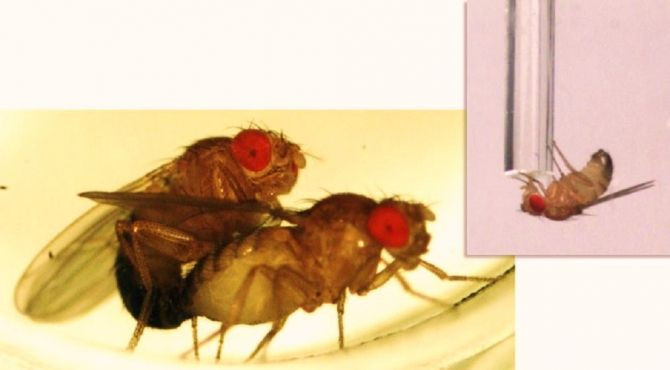Sex-Deprived Flies Turn to Alcohol, Drink Four Times More than Others

Sexually-deprived male fruit flies are significantly more likely to choose to eat alcoholic foods when female fruit flies reject their sexual advances, compared to sexually-satisfied male flies, according to new research.
A male fruit fly courts a female by rubbing her genitals, tapping her abdomen and singing with his wings, and if she rejects him he will most likely turn to booze, which according to scientists has a similar effect as sex by boosting reward chemical concentrations in the brain.
The reward chemical, which governs this behavior in fruit flies, is a tiny molecule in the fly’s brain called neuropeptide F (NPF), researchers said that different concentrations of this chemical elicits different kinds of behavior. The level of this chemical drops following sexual rejection, and after coping with alcohol, the level of the reward chemical restores and returns to normal concentrations.
The study consisted of 24 male fruit flies (Drosophila melanogaster). Half of the males were placed in a group with 20 female flies ready to mate, allowing them to mate with multiple partners and the other half was placed alone in vials with only one female that had already mated and will not accept any courtship advances.
The findings show that after four days of repeated mating or rejection, the male flies were moved to new containers with tubes delivering either alcoholic or alcohol-free food mash that the flies could eat.
Previous research has already shown that reward pathways in the brains of fruit flies are activated when they drink alcohol. Therefore, like social interactions that also activate the reward pathway, drinking alcohol is a “pleasurable” experience for fruit flies.
Lead researcher neurologist Galit Shohat-Ophir and her team who conducted the work at the University of California, San Francisco, predicted that all the flies would prefer alcohol, but instead found that rejected males actually drank on average four times more alcohol than the mated ones.
"You see that the mated males actually have an aversion to the alcohol-containing food," Shohat-Ophir said to Science, where her study was published. "And the rejected males have a high preference to that food with alcohol." Additionally, if sex-deprived males got a last-minute chance to mate after rejection, they appeared to be less interested in alcohol than other sex-starved males that were not given the same chance.
However, if given NPF artificially, even a sex-starved male fly will turn away from alcohol, and if researcher artificially lowered the levels of NPF receptors in the brain, males that had mated would act like those that were rejected by drinking more ethanol-containing solution.
NPF could also be rewarding without either sex or alcohol, researchers said. After conditioning the flies to associate a burst of NPF with a particular smell, the flies would naturally gravitate towards the smell like they did alcohol.
“It’s a switch that represents the level of reward in the brain and translates it into reward-seeking behavior,” Shohat-Ophir said in a statement.
Researchers believe that the new findings may provide new understanding on the brain mechanisms that make social interaction rewarding for animals as well as those that trigger human addiction. They believe that regulating levels of neuropeptide Y in people may parallel the behavior observed in fruit flies and alter addictive behavior.
Scientists know that reduced levels of neuropeptide Y are shown in people who suffer from depression, post-traumatic stress disorder and other conditions that may predispose people towards excessive alcohol and drug abuse. However, experts noted that manipulating the neuropeptide Y may not be as easy regulating it in fruit flies because the molecule is distributed all over the human brain and has roles in eating anxiety, sleep, and alcohol consumption.
Researcher conclude that the main finding of the latest research is that experiences are translated into a molecular signature through levels of NPF, and levels of the molecule drive behaviors like drinking to restore the reward system to normal levels.
"They showed that NPF is necessary to mediate this link between sex and alcohol, and also that NPF is sufficient for the association," Zars says. "That's two strong arguments that this is a real connection and not mediated in some other way."
"This is an amazing link," neurogeneticist Troy Zars of the University of Missouri, Columbia, who was not involved in the study told Science.
"They showed that NPF is necessary to mediate this link between sex and alcohol, and also that NPF is sufficient for the association," Zars added. "That's two strong arguments that this is a real connection and not mediated in some other way."
The findings were published this week in the journal Science.



























